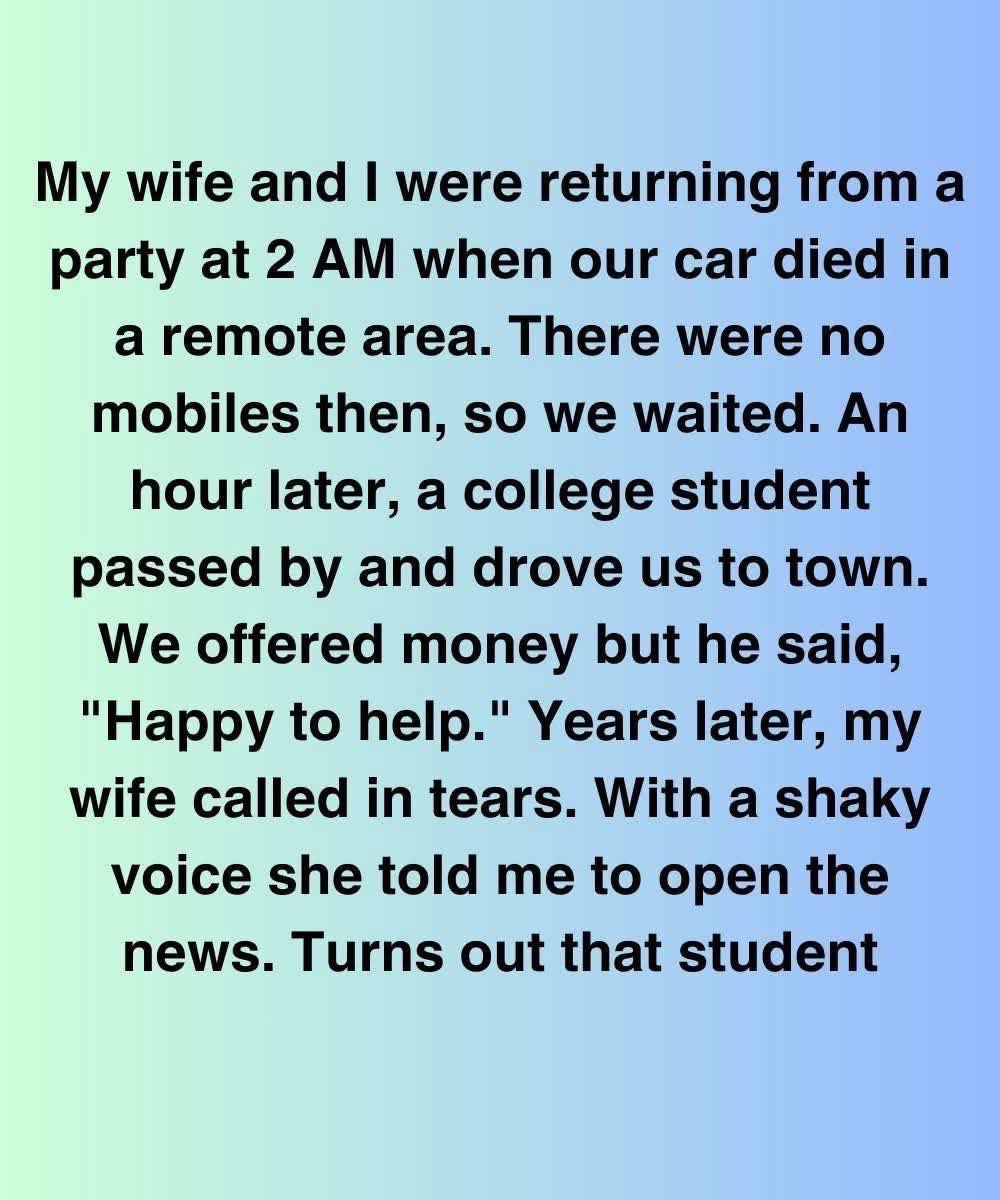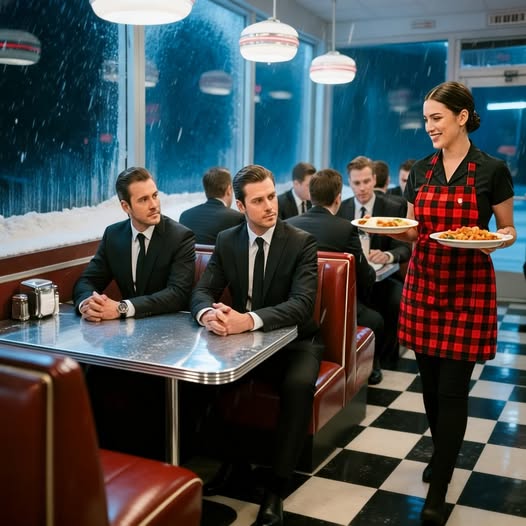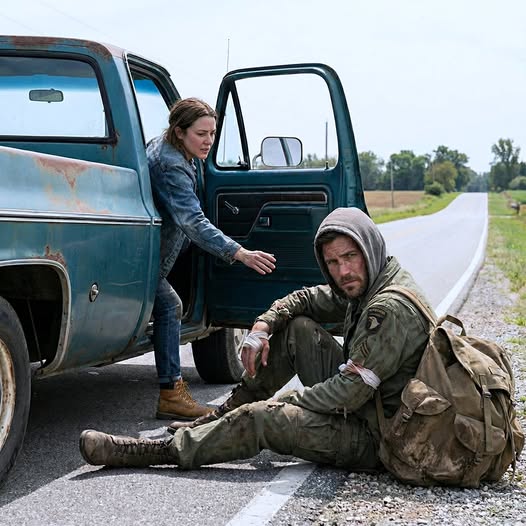It was a chilly night when my wife and I found ourselves stranded on a desolate road after a party. Our car had died at 2 AM, and this was a time before mobile phones. We could do nothing but wait, feeling the cold seep into our bones. An hour passed in anxious silence when a college student appeared, offering us a lifeline.
Without hesitation, he drove us into town, refusing any payment. “Happy to help,” he said with a warm smile. Years later, my wife called me in tears. With a shaky voice, she urged me to check the news.
To my astonishment, the young man who’d once rescued us was now making headlines.
Dr. Naveen Varma. Newly elected to Congress, he was a rising star in politics. The same kid who had helped us on that quiet, unlit road outside Dunridge. I could hardly believe it. He looked different—leaner and dressed sharply—but those wide eyes were unmistakable. I remembered his name, scribbled on a piece of paper, along with his address in case we ever needed help again.
We never reached out. Life got busy, and years slipped by. Then came the moment when we found ourselves in need once more—but this time, not for a ride.
The Story of Arush
Our son, Arush, had always been a bright and diligent student, the pride of our family. He was the first to attend a prestigious private university in Delhi, and we were overjoyed. But soon, things took a troubling turn.
Two months into his second year, his calls became infrequent. The texts, once filled with excitement, dwindled to terse replies: “Fine,” “Busy,” “Will call later.” My wife sensed something was wrong long before I did—mother’s intuition, I suppose. I assumed it was just the pressures of college life.
When Arush finally came home one weekend, he looked exhausted, and the worry etched on his face spoke volumes. After dinner, he sat us down and confessed, “I messed up.”
He had gotten involved in a student-run business that began innocently—buying and reselling electronics. But it spiraled into something darker, with whispers of counterfeit goods and shady suppliers. Then the police were alerted.
While Arush hadn’t committed any crime directly, his name was tied to the business. His roommate had fled, leaving him in a precarious position under investigation. Fear enveloped us all.
We sought legal counsel, but we quickly realized we needed more than just a local lawyer—we needed someone influential. That’s when my wife brought up Naveen again.
“Do you think he’d remember us?” she asked, a hopeful glint in her eyes.
I was skeptical. “Even if he did, he’s a politician. He must get hundreds of calls daily.”
But my wife insisted we try.
Reaching Out
I rifled through an old drawer, finding a little metal box filled with memories. There it was—a faded piece of paper, his handwriting still legible: Naveen Varma. Hostel 2C. IIT Kanpur. Below it, a landline number that was surely outdated.
Armed with that information, we managed to trace him to his official office. I penned a heartfelt letter—handwritten, because no email could capture our emotions. I recounted that night in ’92, the flat tire, the moonlight, and how a young man had stopped for strangers without asking for anything in return.
In closing, I wrote, “We raised our son to be kind like you. He made a mistake, but we’re not asking you to erase it. Just help us ensure it doesn’t ruin his life before it’s even begun.”
We mailed the letter and waited.
A Hopeful Response
Two weeks passed, and then came a reply—on official letterhead.
“Of course I remember. I’m sorry to hear about Arush. I’ll be in Delhi next month. Please come see me. Let’s talk.”
My wife was in tears—not just because of the offer, but because he remembered us. In a world where so many forget, that acknowledgment meant everything.
When we met Naveen in his modest office—not the lavish setting one might expect from a politician—he greeted us with warmth. He turned to Arush and said, “You’ve had a rough year. I’ve read everything your father sent. You deserve someone in your corner.”
Then he did something unexpected. He called in a senior legal advisor, and within minutes, we were discussing next steps, damage control, and statements—pro bono.
While Naveen didn’t promise to make the situation disappear, he assured us Arush wouldn’t face this alone.
A Turning Point
Over the next six months, Arush avoided jail time. The case didn’t vanish, but with the right legal guidance, it became evident he was more naive than criminal. He received a warning, completed community service, and lost a semester—but he remained in school.
More importantly, he learned a valuable lesson.
A year later, Arush began volunteering at an NGO focused on financial literacy for underprivileged youth. What began as a weekend commitment blossomed into a passion.
“If someone had taught me the basics, maybe I wouldn’t have followed bad advice. Maybe I can do that for someone else,” he said.
By his final year, he was leading workshops in two districts.
A New Connection
At one of these workshops, he met a young woman named Pia. Sharp and eager, she approached him with a plethora of questions, and their project collaboration led to coffee dates, dinners, and weekends spent together.
We met Pia six months later. Strong, articulate, and kind, she immediately endeared herself to us.
Then came the surprising revelation: Pia’s mother had been imprisoned for a crime she didn’t commit—framed by a business partner. After three years, she was released, but the ordeal had nearly torn their family apart. Pia had watched her mother rebuild her life from scratch.
This shared history of resilience drew Arush and Pia together. Their pasts didn’t haunt them; they fueled their purpose.
A year after graduation, they married in a simple ceremony surrounded by close friends. Naveen was there, quietly seated in the back, and my wife cried when he hugged her afterward.
A Legacy of Kindness
Fast forward three years: Arush and Pia now run their own nonprofit, teaching digital and financial literacy in low-income areas. They empower students to navigate complex systems and avoid predatory schemes.
Their motto? One mistake shouldn’t end a future.
I often reflect on that night by the roadside. Our frozen hands, the silence shattered by headlights—a stranger who owed us nothing but stopped anyway.
Unbeknownst to us then, he would save us twice: once on that lonely road and again, years later, when it truly mattered.
A Lesson in Kindness
I’ve learned that kindness doesn’t always yield immediate returns—it keeps receipts. Sometimes, it circles back in ways we never imagined.
So, if you ever have the chance to help someone, take it. Even if no one’s watching, even if it seems small. You never know who you’re lifting or how they might uplift others down the line.
If this story touched you, please like and share it with those who believe in second chances.


